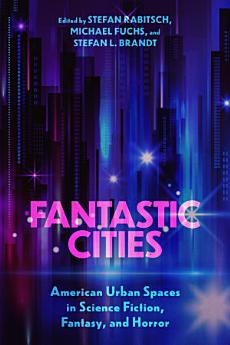Fantastic Cities: American Urban Spaces in Science Fiction, Fantasy, and Horror
Stefan Rabitsch · Michael Fuchs · Stefan L. Brandt
Feb 2022 · Univ. Press of Mississippi
Ebook
322
Pages
reportRatings and reviews aren’t verified Learn More
About this ebook
Contributions by Carl Abbott, Jacob Babb, Marleen S. Barr, Michael Fuchs, John Glover, Stephen Joyce, Sarah Lahm, James McAdams, Cynthia J. Miller, Fernando Gabriel Pagnoni Berns, Chris Pak, María Isabel Pérez Ramos, Stefan Rabitsch, J. Jesse Ramírez, A. Bowdoin Van Riper, Andrew Wasserman, Jeffrey Andrew Weinstock, and Robert Yeates
Metropolis, Gotham City, Mega-City One, Panem’s Capitol, the Sprawl, Caprica City—American (and Americanized) urban environments have always been a part of the fantastic imagination. Fantastic Cities: American Urban Spaces in Science Fiction, Fantasy, and Horror focuses on the American city as a fantastic geography constrained neither by media nor rigid genre boundaries. Fantastic Cities builds on a mix of theoretical and methodological tools that are drawn from criticism of the fantastic, media studies, cultural studies, American studies, and urban studies.
Contributors explore cultural media across many platforms such as Christopher Nolan’s Dark Knight Trilogy, the Arkham Asylum video games, the 1935 movie serial The Phantom Empire, Kim Stanley Robinson’s fiction, Colson Whitehead’s novel Zone One, the vampire films Only Lovers Left Alive and A Girl Walks Home Alone at Night, Paolo Bacigalupi’s novel The Water Knife, some of Kenny Scharf’s videos, and Samuel Delany’s classic Dhalgren. Together, the contributions in Fantastic Cities demonstrate that the fantastic is able to “real-ize” that which is normally confined to the abstract, metaphorical, and/or subjective. Consequently, both utopian aspirations for and dystopian anxieties about the American city become literalized in the fantastic city.
Metropolis, Gotham City, Mega-City One, Panem’s Capitol, the Sprawl, Caprica City—American (and Americanized) urban environments have always been a part of the fantastic imagination. Fantastic Cities: American Urban Spaces in Science Fiction, Fantasy, and Horror focuses on the American city as a fantastic geography constrained neither by media nor rigid genre boundaries. Fantastic Cities builds on a mix of theoretical and methodological tools that are drawn from criticism of the fantastic, media studies, cultural studies, American studies, and urban studies.
Contributors explore cultural media across many platforms such as Christopher Nolan’s Dark Knight Trilogy, the Arkham Asylum video games, the 1935 movie serial The Phantom Empire, Kim Stanley Robinson’s fiction, Colson Whitehead’s novel Zone One, the vampire films Only Lovers Left Alive and A Girl Walks Home Alone at Night, Paolo Bacigalupi’s novel The Water Knife, some of Kenny Scharf’s videos, and Samuel Delany’s classic Dhalgren. Together, the contributions in Fantastic Cities demonstrate that the fantastic is able to “real-ize” that which is normally confined to the abstract, metaphorical, and/or subjective. Consequently, both utopian aspirations for and dystopian anxieties about the American city become literalized in the fantastic city.
About the author
Stefan Rabitsch is associate professor of American studies at the University of Oslo, Norway. He is author of “Star Trek” and the British Age of Sail: The Maritime Influence Throughout the Series and Films and coeditor of Set Phasers to Teach! “Star Trek” in Research and Teaching and The Routledge Handbook of “Star Trek.” Michael Fuchs is coeditor of Intermedia Games—Games Inter Media: Video Games and Intermediality; ConFiguring America: Iconic Figures, Visuality, and the American Identity; Placing America: American Culture and Its Spaces; and Landscapes of Postmodernity: Concepts and Paradigms of Critical Theory. Stefan L. Brandt is professor of American studies at the University of Graz in Austria. He is author of The Culture of Corporeality: Aesthetic Experience and the Embodiment of America, 1945–1960 and coeditor of Ecomasculinities: Negotiating Male Gender Identity in U.S. Fiction; Space Oddities: Difference and Identity in the American City; Making National Bodies: Cultural Identity and the Politics of the Body in (Post-)Revolutionary America; and Transnational American Studies.
Rate this ebook
Tell us what you think.
Reading information
Smartphones and tablets
Install the Google Play Books app for Android and iPad/iPhone. It syncs automatically with your account and allows you to read online or offline wherever you are.
Laptops and computers
You can listen to audiobooks purchased on Google Play using your computer's web browser.
eReaders and other devices
To read on e-ink devices like Kobo eReaders, you'll need to download a file and transfer it to your device. Follow the detailed Help Center instructions to transfer the files to supported eReaders.




